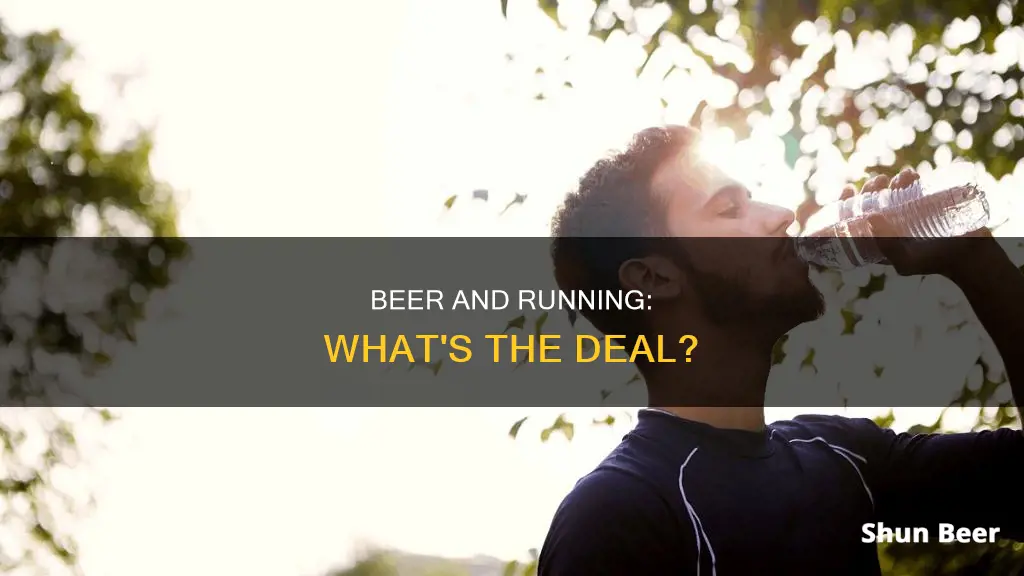
There's a reason why many runners enjoy a cold beer after a long, hot run. But is it a good idea? A review of 16 studies found that beer can be a decent post-run beverage, provided it's low-alcohol (less than 4%) and consumed in moderation. Beer is rich in polyphenols, which may prevent respiratory infections during heavy training, and it contains carbs, electrolytes, and sodium, which can aid recovery and rehydration. However, alcohol blocks glycogen synthesis, so it's important to have a snack with carbs and protein after a run, and to prioritise rehydrating with water. While the occasional beer after a run is not harmful, it's important to remember that it's not a health drink and should be consumed in moderation.
| Characteristics | Values |
|---|---|
| Is drinking beer after running good for you? | Drinking beer after running isn't better than an energy drink or water, but it's also not worse. |
| Is beer a good post-run recovery drink? | Beer can be a decent post-run beverage if you're careful. Low-alcohol beer (less than 4%) is more effective at helping athletes rehydrate after exercise than higher-alcohol beers. |
| Is beer good for post-run rehydration? | Beer contains carbs, electrolytes, and sodium, which are needed after losing fluids. However, drinking too much beer or consuming higher ABV beers can lead to dehydration. |
| Is drinking beer after running harmful? | While beer isn't the best source of nutrition, having a beer or two after a run is unlikely to be harmful, especially if paired with a snack containing carbs and protein. |
What You'll Learn

Beer can be a good recovery drink
Now, let's delve into the potential benefits of beer as a recovery drink. Beer, especially low-alcohol beer, can aid in rehydration after exercise. A 2015 study published in the Journal of the International Society of Sports Nutrition found that moderate beer intake post-workout had "no deleterious effects on markers of hydration in active individuals." In other words, it hydrated them just fine. Beer also contains carbohydrates, electrolytes, and sodium, all of which are essential for replenishing what your body loses during a workout.
Additionally, beer is rich in polyphenols, which may help prevent respiratory infections during heavy training. A 2011 study from the Technical University of Munich found that runners who drank non-alcoholic beer before and after running a marathon experienced less inflammation and fewer upper respiratory infections. So, if you're concerned about staying healthy during intense training periods, beer might offer some benefits.
However, it's important to consume beer in moderation and be mindful of its alcohol content. As Christopher Gillen, a professor of biology at Kenyon College and avid runner, points out, animal studies have shown that alcohol blocks glycogen synthesis, which could undo the benefits of carbohydrate intake. Therefore, it's crucial to pair your beer with a proper recovery snack that includes both carbohydrates and protein.
When choosing a beer for recovery, opt for one that is low in alcohol, ideally less than 4% ABV. This will help you avoid diuresis, or the frequent need to use the bathroom, which can be counterproductive to rehydration. Also, remember that beer should complement your hydration routine, not replace it. Be sure to drink plenty of water before and after your workout, along with your beer.
In conclusion, beer can be a good recovery drink when consumed in moderation and paired with proper nutrition and hydration. It offers some rehydration benefits, provides carbohydrates and electrolytes, and may even help prevent respiratory infections. However, it's important to be mindful of the alcohol content and its potential impact on glycogen synthesis. So, go ahead and enjoy that post-run beer, but remember to do so in a balanced and informed manner.
Beer and Azo: What You Need to Know
You may want to see also

Beer is rich in polyphenols
Beer is a rich source of polyphenols, which are molecules containing one or more aromatic rings and two or more hydroxyl (OH) groups attached to the rings. These polyphenols are derived from the hops and malt used in brewing and can make up 30% and 70%-80% of the total polyphenol content, respectively. Polyphenols are known for their antioxidant properties, which can help counteract the formation of harmful free radicals in the body.
The presence of polyphenols in beer has been linked to several health benefits. For example, a study by Domenico et al. (2020) found that beer polyphenols exhibited antioxidant, proliferating, and antisenescent effects on dental-derived stem cells and human intestinal epithelial cells. Additionally, the bioavailability of beer polyphenols was higher than that of control standards, suggesting their potential therapeutic value.
Other studies have also reported the positive effects of beer polyphenols on biological systems. For instance, Tatullo et al. (2016) found that a bioactive polyphenolic fraction isolated from the brewing process had antioxidant and antitumor activities. Furthermore, Piazzon et al. (2010) identified phenolic compounds in different types of beer, with potential health benefits.
While polyphenols have health benefits, excessive consumption can lead to negative effects. High levels of polyphenols in craft beer, for instance, can result in harsh flavors and excessive turbidity. Additionally, the presence of polyphenols can contribute to beer haze formation, which affects the beer's appearance and stability.
In conclusion, beer is a rich source of polyphenols, which have been associated with various health benefits. However, moderation is key, as excessive consumption can lead to negative effects. Further studies are needed to fully understand the role of beer polyphenols and their impact on human health.
Beer Chillers: How Do They Work?
You may want to see also

Beer is a good way to socialise
There are a variety of opinions on whether beer is beneficial after a run. Some sources claim that drinking beer after a run is not better than drinking a formulated energy drink or water, but it is also not worse. A 2015 study published in the Journal of the International Society of Sports Nutrition found that drinking a moderate amount of beer after a workout had "no deleterious effects on markers of hydration in active individuals". Beer also contains carbs, electrolytes, and sodium, which are all things your body needs after losing fluids. However, for beer to truly work as a recovery drink, it is best to stick to low-alcohol options (less than 4-5%) and limit yourself to one or two.
However, it is important to note that drinking alcohol is not the only way to socialise, and there are other options for those who do not want to drink. Meeting for coffee or lunch can be a good alternative, as it is often quieter and there are fewer distractions, making it easier to talk and giving your conversation a clear endpoint. Trying new activities with friends, such as going to see a play or ice skating, can also be a fun way to socialise without alcohol.
Additionally, it is important to be mindful of the potential negative effects of drinking alcohol. While low-alcohol beers can be a good option for those who want to socialise with a drink, it is still important to consume them in moderation. Drinking too much alcohol can lead to negative consequences, such as impaired judgment and reckless behaviour. It can also be easy to drink more than intended, especially if drinking is used as a way to socialise, which can result in negative health effects and a hangover. Ultimately, the decision to drink alcohol or not is a personal choice, and it is possible to have a healthy social life with or without alcohol.
Mixing Beer and Acetaminophen: What You Need to Know
You may want to see also

Beer is not a health drink
While some sources claim that beer has certain health benefits, it is important to remember that it is not a health drink. Beer is an alcoholic beverage produced by fermenting grain into alcohol, and excessive consumption can lead to various health issues. Here are some reasons why beer should not be considered a health drink:
- Potential for Addiction: Alcohol is an addictive substance, and beer consumption is no exception. People with a family history of addiction should be cautious, as heavy drinking can quickly lead to dependency.
- Reduced Life Expectancy: Contrary to the notion that moderate drinking may increase lifespan, heavy consumption of beer significantly reduces life expectancy. Studies indicate that excessive drinking can shorten life by up to 28 years.
- Liver Disease: Drinking more than two beers per day significantly increases the risk of developing fatty liver disease or cirrhosis. The negative impact on the liver is one of the most serious consequences of long-term, excessive alcohol consumption.
- Weight Gain and "Beer Belly": Many beers are high in calories, and frequent consumption can lead to substantial weight gain, particularly around the waist. This is commonly referred to as a "beer belly." Studies have confirmed the link between beer drinking and increased waist circumference.
- Other Health Risks: Excessive beer consumption is associated with various health issues, including high blood pressure, gout, insomnia, liver disease, stomach ulcers, mental health conditions, and more. It can also negatively interact with certain medications, including antibiotics, aspirin, and antidepressants.
- Lack of Scientific Evidence: While some studies suggest potential health benefits, such as improved heart health and blood sugar control, these findings are not conclusive. The positive effects are often dependent on very moderate consumption (one to two drinks per day), and the overall impact on health is still questionable.
In conclusion, while beer may have some nutritional benefits and potential positive effects when consumed in moderation, it is important to recognize that it is not a health drink. Excessive consumption can lead to addiction, reduced life expectancy, liver disease, weight gain, and various other health risks. As with any alcoholic beverage, moderation is key to minimizing potential harm.
The Chemistry of Beer: How It Works and Why It Matters
You may want to see also

Beer can be paired with a non-alcoholic drink
Beer has become increasingly popular as a post-run drink, with some magazines even promoting the beverage's benefits in articles. However, it is important to note that while beer can be hydrating, it is not better for you than a formulated energy drink or water.
If you do choose to drink beer after a run, it is best to opt for low-alcohol options (less than 4-5% ABV) and to limit yourself to just one or two. This is because the alcohol content in beer could have negative effects, and drinking too many can reverse the beverage's benefits, leading to dehydration. To avoid this, it is recommended to pair your beer with a non-alcoholic drink. Here are some non-alcoholic drink options that can be paired with beer:
- Non-alcoholic beer: Non-alcoholic beers, or NA beers, have gained popularity and can be a great alternative to their alcoholic counterparts. They often have less than 0.5% ABV and can provide a similar taste experience without the alcohol content.
- Virgin cocktails: You can order non-alcoholic versions of classic cocktails like a Moscow Mule, Old Fashioned, Piña Colada, or a Bloody Mary. Simply ask the bartender to omit the alcohol or use a non-alcoholic spirit as a substitute.
- Simple syrup and soda: Ask the bartender to add a splash of flavored simple syrup to your soda for an adult soda experience.
- Fizzy fruit juice: Top your favorite juice with soda water to make it fizzy. Grapefruit juice is a good option if you want to avoid anything too sweet, and orange juice with soda water can create a virgin mimosa.
- Coffee-based drinks: Espresso martinis are a popular trend, and you can enjoy a non-alcoholic version by ordering one without the alcohol and adding a little extra coffee if it's too sweet.
- Non-alcoholic hot toddy: A warm and soothing drink that can be made with tea, honey, lemon, and various spices like cloves and cinnamon.
- Club soda and lime: A simple yet refreshing option that can be made to look like a vodka soda but without the alcohol.
These are just a few examples of non-alcoholic drinks that can be paired with beer. It is important to remember that while beer can be a part of an active lifestyle, it should be consumed in moderation and paired with non-alcoholic options to stay hydrated and avoid negative effects.
Beer and Covid Shots: What You Need to Know
You may want to see also
Frequently asked questions
A 2015 study found that moderate beer intake post-workout had "no deleterious effects on markers of hydration in active individuals". In other words, it hydrated them.
Beer can be a decent rehydration drink, scoring a 5 or 6 out of 10. It contains carbohydrates, polyphenols, electrolytes, and sodium, which help with fluid loss. However, non-alcoholic beer is a better option for rehydration, and you can make it even more effective by adding a little salt.
Low-alcohol beer (less than 4% ABV) is more effective at helping athletes rehydrate after exercise than higher-alcohol beers. If you go for a beer that's over 4% ABV, it's recommended to pair it with a non-alcoholic drink to prevent diuresis.
A 2011 study found that runners who drank non-alcoholic beer before and after running a marathon had less inflammation and fewer upper respiratory infections than those who drank a placebo. Beer is also rich in polyphenols, which could help prevent respiratory infections during heavy training.
While drinking beer after a run isn't worse for you than an energy drink or water, it's also not better. Beer is essentially empty calories and provides very little nutritional benefit. It won't do much for your glycogen stores, but as long as you're having a snack with carbs and protein, a beer or two probably isn't harmful.







